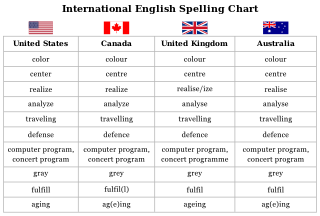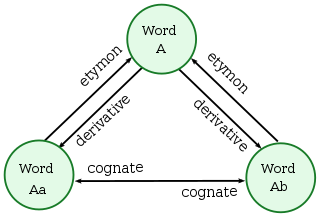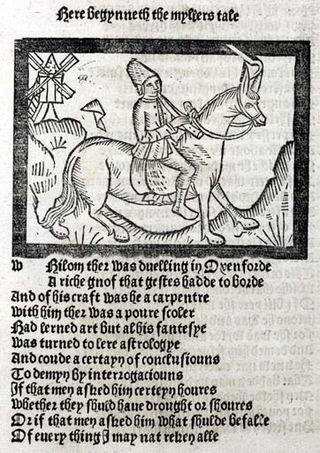Related Research Articles

British English is, according to Oxford Dictionaries, "English as used in Great Britain, as distinct from that used elsewhere". More narrowly, it can refer specifically to the English language in England, or, more broadly, to the collective dialects of English throughout the British Isles taken as a single umbrella variety, for instance additionally incorporating Scottish English, Welsh English, and Northern Irish English. Tom McArthur in the Oxford Guide to World English acknowledges that British English shares "all the ambiguities and tensions [with] the word 'British' and as a result can be used and interpreted in two ways, more broadly or more narrowly, within a range of blurring and ambiguity".

In historical linguistics, cognates or lexical cognates are sets of words in different languages that have been inherited in direct descent from an etymological ancestor in a common parent language. Because language change can have radical effects on both the sound and the meaning of a word, cognates may not be obvious, and often it takes rigorous study of historical sources and the application of the comparative method to establish whether lexemes are cognate or not. Cognates are distinguished from loanwords, where a word has been borrowed from another language.

Maltese, is a Semitic language derived from late medieval Sicilian Arabic with Romance superstrata spoken by the Maltese people. It is the national language of Malta and the only official Semitic and Afro-Asiatic language of the European Union. Maltese is a latinised variety of spoken historical Arabic through its descent from Siculo-Arabic, which developed as a Maghrebi Arabic dialect in the Emirate of Sicily between 831 and 1091. As a result of the Norman invasion of Malta and the subsequent re-Christianisation of the islands, Maltese evolved independently of Classical Arabic in a gradual process of latinisation. It is therefore exceptional as a variety of historical Arabic that has no diglossic relationship with Classical or Modern Standard Arabic. Maltese is thus classified separately from the 30 varieties constituting the modern Arabic macrolanguage. Maltese is also distinguished from Arabic and other Semitic languages since its morphology has been deeply influenced by Romance languages, namely Italian and Sicilian.

Middle English is a form of the English language that was spoken after the Norman conquest (1066) until the late 15th century. The English language underwent distinct variations and developments following the Old English period. Scholarly opinion varies, but the Oxford English Dictionary specifies the period when Middle English was spoken as being from 1150 to 1500. This stage of the development of the English language roughly followed the High to the Late Middle Ages.
International scientific vocabulary (ISV) comprises scientific and specialized words whose language of origin may or may not be certain, but which are in current use in several modern languages.

The core of the English language descends from the Old English language, brought from the 500s with the Anglo, Saxon, and Jutish settlers to what would be called England. The bulk of the language in spoken and written texts is from this source. As a statistical rule, around 70 percent of words in any text are Anglo-Saxon. Moreover, the grammar is largely Anglo-Saxon.

English is a West Germanic language that originated from Ingvaeonic languages brought to Britain in the mid-5th to 7th centuries AD by Anglo-Saxon migrants from what is now northwest Germany, southern Denmark and the Netherlands. The Anglo-Saxons settled in the British Isles from the mid-5th century and came to dominate the bulk of southern Great Britain. Their language originated as a group of Ingvaeonic languages which were spoken by the settlers in England and southern and eastern Scotland in the early Middle Ages, displacing the Celtic languages that had previously been dominant. Old English reflected the varied origins of the Anglo-Saxon kingdoms established in different parts of Britain. The Late West Saxon dialect eventually became dominant. A significant subsequent influence on the shaping of Old English came from contact with the North Germanic languages spoken by the Scandinavian Vikings who conquered and colonized parts of Britain during the 8th and 9th centuries, which led to much lexical borrowing and grammatical simplification. The Anglian dialects had a greater influence on Middle English.

The following are lists of words in the English language that are known as "loanwords" or "borrowings," which are derived from other languages.
Linguistic purism in English involves opposition to foreign influence in the English language. English has evolved with a great deal of borrowing from other languages, especially Old French, since the Norman conquest of England, and some of its native vocabulary and grammar have been supplanted by features of Latinate and Greek origin. Efforts to remove or consider the removal of foreign terms in English are often known as Anglish, a term coined by author and humorist Paul Jennings in 1966.
Although English is a Germanic language, it has Latin influences. Its grammar and core vocabulary are inherited from Proto-Germanic, but a significant portion of the English vocabulary comes from Romance and Latinate sources. A portion of these borrowings come directly from Latin, or through one of the Romance languages, particularly Anglo-Norman and French, but some also from Italian, Portuguese, and Spanish; or from other languages into Latin and then into English. The influence of Latin in English, therefore, is primarily lexical in nature, being confined mainly to words derived from Latin and Greek roots.
In etymology, two or more words in the same language are called doublets or etymological twins or twinlings when they have different phonological forms but the same etymological root. Often, but not always, the words entered the language through different routes. Given that the kinship between words that have the same root and the same meaning is fairly obvious, the term is mostly used to characterize pairs of words that have diverged at least somewhat in meaning. For example, English pyre and fire are doublets with merely associated meanings despite both descending ultimately from the same Proto-Indo-European (PIE) word *péh₂ur.

An inkhorn term is a loanword, or a word coined from existing roots, which is deemed to be unnecessary or overly pretentious.
The replacing of loanwords in Turkish is part of a policy of Turkification of Atatürk. The Ottoman Turkish language had many loanwords from Arabic and Persian, but also European languages such as French, Greek, and Italian origin—which were officially replaced with their Turkish counterparts suggested by the Turkish Language Association as a part of the cultural reforms—in the broader framework of Atatürk's Reforms—following the foundation of the Republic of Turkey.
The lexis of Bulgarian, a South Slavic language, consists of native words, as well as borrowings from Russian, French, and to a lesser extent English, Greek, Ottoman Turkish, Arabic and other languages.
Reborrowing is the process where a word travels from one language to another and then back to the originating language in a different form or with a different meaning. This path is indicated by A → B → A, where A is the originating language, and can take many forms. A reborrowed word is sometimes called a Rückwanderer.
Many words that existed in Old English did not survive into Modern English. There are also many words in Modern English that bear little or no resemblance in meaning to their Old English etymons. Some linguists estimate that as much as 80 percent of the lexicon of Old English was lost by the end of the Middle English period, including many compound words, e.g. bōchūs, yet the components 'book' and 'house' were kept. Certain categories of words seem to have been more susceptible. Nearly all words relating to sexual intercourse and sexual organs as well as "impolite" words for bodily functions were ignored in favor of words borrowed from Latin or Ancient Greek. The Old English synonyms are now mostly either extinct or considered crude or vulgar, such as arse/ass.
The re-latinization of Romanian was the reinforcement of the Romance features of the Romanian language during the 18th and 19th centuries. In this period, Romanian adopted a Latin-based alphabet to replace the Cyrillic script and borrowed many words from French as well as from Latin and Italian, in order to acquire the lexical tools necessary for modernization. This process coined words for recently introduced objects or concepts (neologisms), added Latinate synonyms for some Slavic and other loanwords, and strengthened some Romance syntactic features.
References
- ↑ Stephan Gramley, Kurt-Michael Pätzold, A survey of modern English (Routledge, 2003)
- 1 2 3 4 5 6 Transactions and proceedings of the New Zealand Institute, Volume 34 , (New Zealand Institute., 1902) pp. 135–145
- 1 2 3 4 Anglo-Saxon and Latinate Words by M. Birch http://www.translationdirectory.com/article991.htm